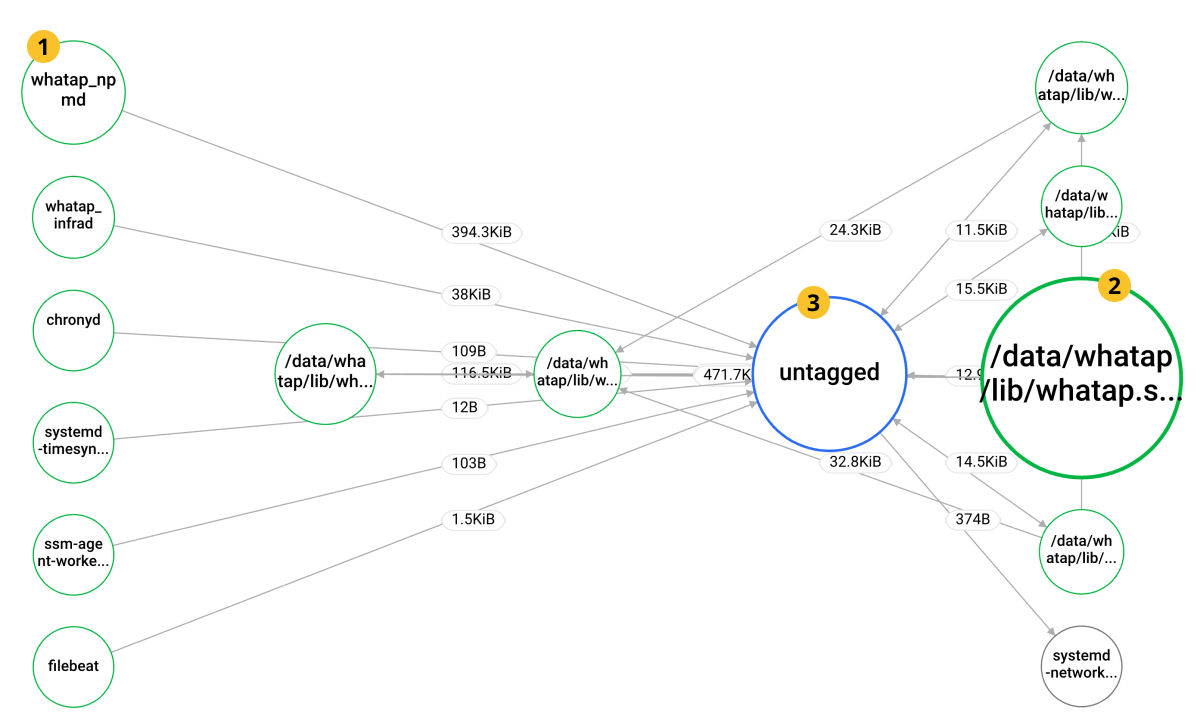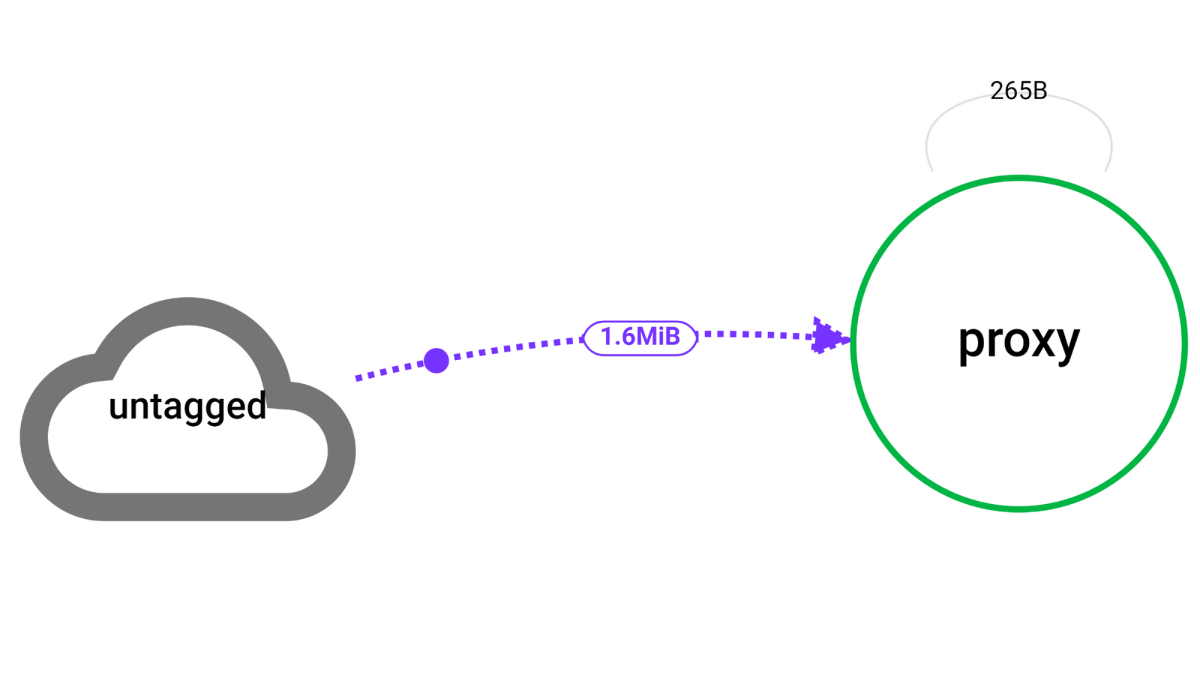Setting the tagRule
Tag is a criterion for expressing the data collected from the monitored servers in group units. The most important factor in NPM is visibility. Grouping is essential to secure visibility in an environment where irregular and diverse data is pouring into the network.
The agent collects the IP addresses, ports (Source, Target), host names, and process names in raw data with keys. Based on the collected data, you can set the group units for the nodes to be displayed in a topology or charts.
Along with the tags collected by agents, the rules have been created to be easily changed and applied. The options can be applied by modifying the tagRule.yaml file in the agent installation path (/usr/whatap/whatap-npmd).
tagRule option
The result of the tagRule option appears in Dashboard > Network Topology. Grouping simplifies the correlation between complex and irregular networks and allows you to visualize the performance of abstracted networks for monitoring.

-
It is the
node with the tagRule option applied. It simplifies long and complex process names to display on nodes.
-
It is the
node to which the tagRule option is not applied. Because it is hard to identify the process, be sure to apply the tagRule option to simplify the process name, such as
node.
-
The
node cannot acquire its host and process data. For more information, see the following.
Simplifying the process name
Option: processRegex
It simplifies long process names that are obscure. For example, Java processes include JVM launch options and the like as follows.
java -Dzookeeper.log.dir=/data/wpm/zookeeper/bin/../logs -Dzookeeper.log.file=zookeeper-whatap-server-Dev-Modules.log -XX:+HeapDumpOnOutOfMemoryError -XX:OnOutOfMemoryError=kill -9 %p -cp /data/wpm/zookeeper/bin/../zookeeper-server/target/classes:/data/wpm/zookeeper/bin/../build/classes:/data/wpm/zookeeper/bin/../zookeeper-server/target/lib/*.jar:/data/wpm/zookeeper/bin/../build/lib/*.jar:/data/wpm/zookeeper/bin/../lib/zookeeper-prometheus-metrics-3.8.0.jar:/data/wpm/zookeeper/bin/../lib/zookeeper-jute-3.8.0.jar:/data/wpm/zookeeper/bin/../lib/zookeeper-3.8.0.jar:/data/wpm/zookeeper/bin/../lib/snappy-java-1.1.7.7.jar:/data/wpm/zookeeper/bin/../lib/slf4j-api-1.7.30.jar:/data/wpm/zookeeper/bin/../lib/simpleclient_servlet-0.9.0.jar:/data/wpm/zookeeper/bin/../lib/simpleclient_hotspot-0.9.0.jar:/data/wpm/zookeeper/bin/../lib/simpleclient_common-0.9.0.jar:/data/wpm/zookeeper/bin/../lib/simpleclient-0.9.0.jar:/data/wpm/zookeeper/bin/../lib/netty-transport-native-unix-common-4.1.73.Final.jar:/data/wpm/zookeeper/bin/../lib/netty-transport-native-epoll-4.1.73.Final.jar:/data/wpm/zookeeper/bin/../lib/netty-transport-classes-epoll-4.1.73.Final.jar:/data/wpm/zookeeper/bin/../lib/netty-transport-4.1.73.Final.jar:/data/wpm/zookeeper/bin/../lib/netty-tcnative-classes-2.0.48.Final.jar:/data/wpm/zookeeper/bin/../lib/netty-tcnative-2.0.48.Final.jar:/data/wpm/zookeeper/bin/../lib/netty-resolver-4.1.73.Final.jar:/data/wpm/zookeeper/bin/../lib/netty-handler-4.1.73.Final.jar:/data/wpm/zookeeper/bin/../lib/netty-common-4.1.73.Final.jar:/data/wpm/zookeeper/bin/../lib/netty-codec-4.1.73.Final.jar:/data/wpm/zookeeper/bin/../lib/netty-buffer-4.1.73.Final.jar:/data/wpm/zookeeper/bin/../lib/metrics-core-4.1.12.1.jar:/data/wpm/zookeeper/bin/../lib/logback-core-1.2.10.jar:/data/wpm/zookeeper/bin/../lib/logback-classic-1.2.10.jar:/data/wpm/zookeeper/bin/../lib/jline-2.14.6.jar:/data/wpm/zookeeper/bin/../lib/jetty-util-ajax-9.4.43.v20210629.jar:/data/wpm/zookeeper/bin/../lib/jetty-util-9.4.43.v20210629.jar:/data/wpm/zookeeper/bin/../lib/jetty-servlet-9.4.43.v20210629.jar:/data/wpm/zookeeper/bin/../lib/jetty-server-9.4.43.v20210629.jar:/data/wpm/zookeeper/bin/../lib/jetty-security-9.4.43.v20210629.jar:/data/wpm/zookeeper/bin/../lib/jetty-io-9.4.43.v20210629.jar:/data/wpm/zookeeper/bin/../lib/jetty-http-9.4.43.v20210629.jar:/data/wpm/zookeeper/bin/../lib/javax.servlet-api-3.1.0.jar:/data/wpm/zookeeper/bin/../lib/jackson-databind-2.13.1.jar:/data/wpm/zookeeper/bin/../lib/jackson-core-2.13.1.jar:/data/wpm/zookeeper/bin/../lib/jackson-annotations-2.13.1.jar:/data/wpm/zookeeper/bin/../lib/commons-io-2.11.0.jar:/data/wpm/zookeeper/bin/../lib/commons-cli-1.4.jar:/data/wpm/zookeeper/bin/../lib/audience-annotations-0.12.0.jar:/data/wpm/zookeeper/bin/../zookeeper-*.jar:/data/wpm/zookeeper/bin/../zookeeper-server/src/main/resources/lib/*.jar:/data/wpm/zookeeper/bin/../conf: -Xmx1000m -Dcom.sun.management.jmxremote -Dcom.sun.management.jmxremote.local.only=false org.apache.zookeeper.server.quorum.QuorumPeerMain /data/wpm/zookeeper/bin/../conf/zoo.cfg
In the above case, even if the name is displayed on a topology or chart,, it is difficult to recognize. Only the required parts are extracted from agents as much as possible. Apply the options by referring to the following example.
processRegEx:
- zookeeper
- whatap_[a-zA-Z]*
The processRegex option extracts names via the following rules.
-
Java is the executable JAR file name or method name.
-
Python is the name of the executable script.
However, if the process name is long enough even after extraction, it can be shortened through the option. It can be input in the form of regular expression. If there are multiple rules, the longest matched string is selected.
If you use numerous short rules, you can tag wrong processes unintentionally. Use a unique naming rule.
Process white list
Option: processWhiteList
Set the list of processes to be collected. All data other data than the process specified through the option are ignored.
processWhiteList:
- zookeeper
- whatap_[a-zA-Z]*
If you use the processRegEx option, the name matching the regular expression takes precedence over the OS name.
Process black list
Option: processBlackList
It sets the list of processes to exclude from collection. The process data specified through the option is ignored. If both processWhiteList and processBlackList are in use, data is collected except for the list corresponding to processBlackList among the processWhiteList.
For example, when three processes (zookeeper, whatap_npmd, and whatap_infrad) are running, the following option is applied to collect data for two processes: zookeeper and whatap_infrad.
processWhiteList:
- zookeeper
- whatap_[a-zA-Z]*
processBlackList:
- whatap_npmd
If you use the processRegEx option, the name matching the regular expression takes precedence over the OS name.
Setting the process type
Option: processType
The processType option is a tag for the most basic group represented in topologies and charts. The main purpose is to express processes that play the same role as a single node when the same process is expressed slightly differently depending on the version or OS.
The process name is used as a key and the matching type is specified. For the processes that are not defined with the option, the process name is automatically applied as the process type.
processType:
apache:
- httpd
- apache2
mysql:
- mysqld
- mysqld_safe
If you use the processRegEx option, the name matching the regular expression takes precedence over the OS name.
Setting the App name
Option: appName
The appName option expresses the topology or chart in a form that is easy to understand. In case of the processType option above, the same process is merged into a single node regardless of your intention. For appName, you can express the node in your desired form by specifying the node to express separately and the node to merge through a key combination.
Let's assume the case in which the network configuration of proxy → msa_process → msa_process2 → db is divided into three purposes: operation stage, development stage, and testing stage.
-
In case of visualization with the
processTypeoption -
In case the processes with the same name are divided into operation stage, development stage, and testing stage with the
appNameoptiontagRule.yamlappName:
prod_proxy: # Operation stage
- host_tag: prod_proxy
process_type: proxy
prod_msa1: # Operation stage
- host_tag: prod_msa
process_type: msa_process1
prod_msa2: # Operation stage
- host_tag: prod_msa
process_type: msa_process2
dev_proxy: # Development stage
- host_tag: dev_proxy
process_type: proxy
dev_msa: # Development stage
- host_tag: dev_msa
process_type: msa_process1
- host_tag: dev_msa
process_type: msa_process2
test: # Testing stage
- host_tag: test
db:
- process_type: mysql
-
The keys available by
appNamearehost_tag,process_type,ip, andport. -
The keys that have not been entered are applied as wild cards.
If the appName option is not met, the field or value specified in the appNameDefault option is applied.
-
In
appNameDefault, enter the key to be used by default. -
If you enter any of
host_tagandprocess_type, the field data is automatically assigned toappName. If you enter a string other than that, it is fixed to the value.
appNameDefault: host_tag # host_tag, process_type, custom string
Identification of unclear targets
Option: untagOption
When communicating with a target that does not have an agent installed, such as ELB provided by a Cloud Service Provider (CSP) or external API, the host and process data cannot be acquired. Tags can be set based on the IP and port that you know (or the target to be managed).
If the agent has not been installed and communication is made with the IP or port that has not been defined with the option, it is displayed as an untagged node on the topology.

Set the tag with the IP and port as keys. In case of inbound traffic, set it to 0 because the external port is the client port and is not the fixed service port.
untagOption:
15.165.146.117:
6600: "whatap-proxy"
172.31.24.16:
0: "ELB app/New-gitlab/5fe1a93082df3495"